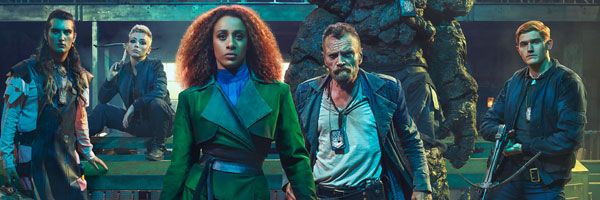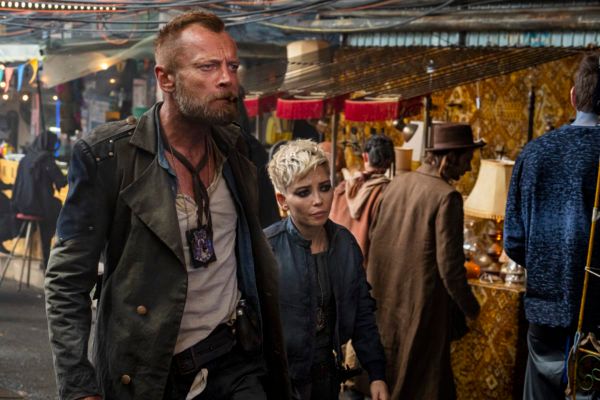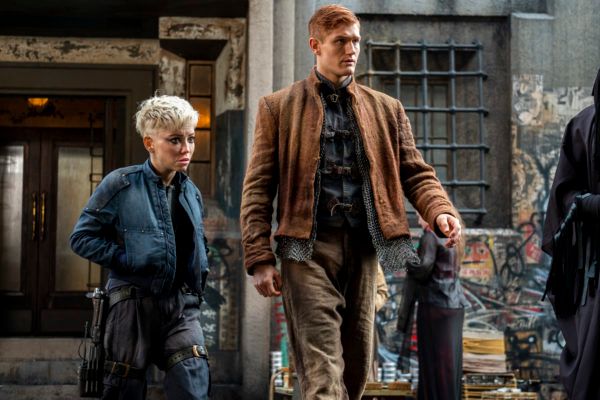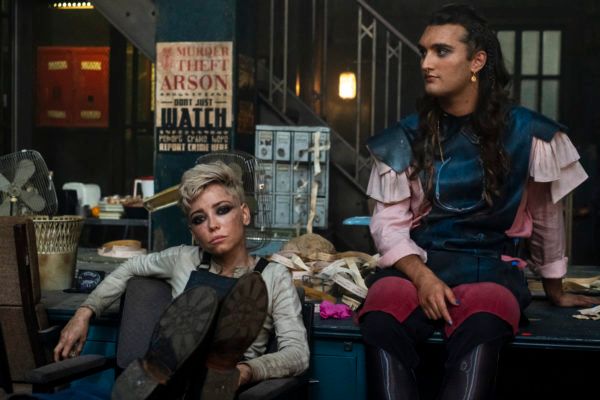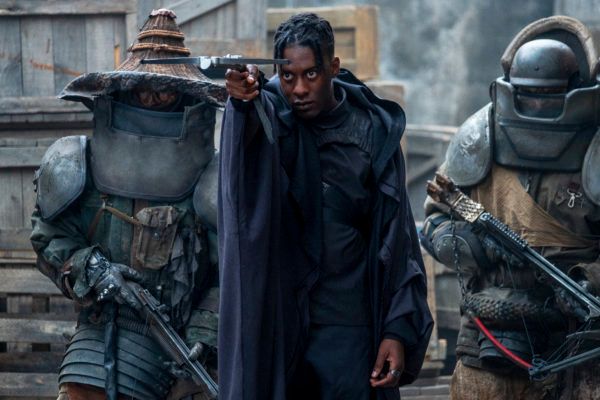The producers behind the upcoming BBC America series The Watch know just how hard a task they took on. "It's the mother of all challenges," executive producer Simon Allen told me during a recent phone interview — because the Discworld novels written by Terry Pratchett, over 40 of which have been published, have a fiercely devoted fanbase, but aren't necessarily the easiest to adapt for the screen.
It helps that the show is focused on Sam Vimes (Richard Dormer) and the people who serve as the titular Watch — this fantasy world's equivalent to a police force, albeit a struggling one. In the world of Ankh-Morpork, abiding by the law is somewhat optional depending on your guild allegiances, which is just one of the fascinating touches the new series incorporates to make sure Pratchett's work fits into a modern era.
Below, Allen and executive producer Richard Stokes explain how they approached the source material to adapt it into a series, what went into some of its unconventional casting choices, how the character of Cheery (Jo Eaton-Kent) was updated for the year 2020, and how they'll end up acknowledging what it means to tell stories about law enforcement right now.
So to start off, talk a little bit about how this came together for you guys.
RICHARD STOKES: I joined as an executive producer at BBC Studios probably now about two years ago. And Simon had already done a couple of drafts, which he can talk about, which has captured the attention of BBC America, because they were looking for a new, exciting, left-field adventure to follow on from the success of Killing Eve.
And we started to build a team together about two years ago, after several years of development. We picked Cape Town to go and shoot in because it's extraordinary and there are amazing film crews and wonderful set builders. We had to stop because of COVID and then took a few months while we concentrated on post-production, but came back to finish off six days of filming about four weeks ago. So it's been quite a long journey.
SIMON ALLEN: They'd been trying to get a show made from the source material for a very long time, and so I was asked to come and look at the whole thing again, look at what kind of show we could make from this material. Let's try and bring a new audience to these incredible books, but also to make something that kind of works on its own terms.
And I just absolutely adore these books. Terry Pratchett is a titan, he's an extraordinary figure in British culture. It's not an exaggeration to mention him in the same breath as Dickens and Shakespeare, I think. And I just kind of felt that was a show to be had, which I hope we've made, that had his amazing self-awareness, the way he's kind of present in his stories as a commentator and narrator. So it needed to be a show that was aware of the fact it's a show subverting conventions and tropes and so on. I felt like there was something really funny to be had, something really thrilling to be had. And we zeroed in on this theme of helplessness and impotence in our show — the city watcher in a very corrupt city where crime is kind of hardwired into its DNA and the journey of this show is all about how they gradually worked their way in from the margins to the center and start to realize that they can do something.
But it has a kind of thematic resonance that I think is really important and universal. And I think a lot of people hopefully will identify with it right now, but I hope it's also a thrill ride. I hope it's really funny. I hope it's really kind of weird and left-field because I feel that we could do with a little more joy in the world right now. And I hope the show gives people joy because it's meant to, it's meant to be a show that picks you up at the end and it doesn't put you down and leave you down.
So, knowing the books, there are a number of subgenres within this universe. How did you know that within the world of this world, you wanted to focus in on the characters of the Watch?
ALLEN: Well, the original agreement was to develop a show called The Watch from those books. But I also think they are the crown jewels of Discworld. There are so many amazing genres and sub-genres and different series, but I think these particular books and these particular characters are a great entry point to that world, because it is essentially about a police force that's helpless and is in a corrupt world, and it's really trying to find purpose and agency.
Of course, we were aware of how awfully precious these things are. What we tried to do is to say that the show refers to the fact that this world exists in a multiverse. So The Watch, the TV show, is not a canon show. It exists in a backwater of the multiverse. It's kind of like JJ Abrams/Kelvin universe of Star Trek. You know, the books are absolutely fine. The books are still there. They will always be there for all time. And The Watch is related to them, of course, but it's absolutely its own thing as well.
STOKES: I think going in hand-holding the audience into a show about a police force, however marginalized and impotent, felt like an easy access into this fantasy world.
ALLEN: And I would also just add that the thing I'm so grateful for was to have that license, to approach this with a lot more latitude. I look at the first Watch book, Guards! Guards!, which is just the most brilliant comedy ever written. It's extraordinary. And then I looked at one of the later Watch books — Night Watch, which has incredible psychological depth and characterization. We've been able to borrow elements from all of those books to try and give you an experience that, if you don't know anything at all about these books whatsoever, it will feel authentic. It will feel related to it. And if you do know something about the books, you're probably going to think it's not canon, it's not faithful, but it still, I think, feels quite Terry Pratchett. I think the way that the humor works, I think the way the characterization works, I think is a good kind of approximation of all the wonderful things that we adore about them.
As adaptation challenges go, this seems like one of the craziest and most impossible, because Pratchett's novels have an extraordinarily passionate fan base that is going to take every single change incredibly personally. So it feels like a very difficult thing to come into.
ALLEN: I mean, you're absolutely right. It's the mother of all challenges. But I think part of that is that what's so great about the books is that they are books, so what Terry Pratchett does is he wields literary conceit and a lot of them worked so brilliantly because he was manipulating that media in a very specific, personal way. And trying to replicate that in television, which has its own kind of traditions and rhythms and forms... I think one of the reasons maybe why a version of the show didn't happen earlier was because that's quite a hard thing to just translate openly without any kind of rethinking. Because a lot of the amazing jokes and a lot of the things that's so wonderful and specific about the books are so dependent on him being present as commentator and narrator in the literary media, in the fantasy genre.
We don't have him and also we're in different mediums. So what we try to do is construct jokes, comedy patterns, characterizations that work in a television format, but in the same way and deliver a similar effect. And I hope we've been successful that time will tell.
When it came to like casting a character, like say, the character known in the book was Cut-Me-Own-Throat Dibbler, what went into casting Ruth Madeley?
ALLEN: I mean, firstly, I'm a huge Ruth Madeley fan. I think a lot of what we did was led by the people that came through the door and the people that were around and we were excited by and we just thought could be a part of this universe. I think that that character works so brilliantly in the books because he is a kind of a trope, the British wheeler-dealer, the dodgy guy. And he worked so well because Pratchett is there telling you about him in a book using literary devices and literary conceits. I think that lifting him out of that and putting them into a TV show in the 21st century — it's worth noting that his first appearance was in a book written in the 20th century. I think he might have struggled to transcend being a trope to anyone that doesn't know the books.
I think with Ruth Madeley, what you get is you get that same kind of energy, but one of the things that was so important to us, because we feel that Discworld is incredibly progressive, but it's not always necessarily optically progressive, right? Because I think when you look to the book covers is it's a lot of white people, it's a lot of people of a particular type in a particular way. And it was lovely to have Ruth Madeley in the show and just have her there as an amazing character and an amazing actor playing this part. She has quite a surprising arc actually. And I just think it was an opportunity to do something really wonderful and exciting with somebody that I think is extraordinary and is going to be a superstar.
STOKES: A lot of our casting choices for this show actually resulted in conversations that Simon and I, and the lead director and the casting director had, which actually sometimes revolved around who are the most exciting up-and-coming talents that we know, and is there a role for them in this show? And I'd worked with Ruth on a short film earlier that year, and she'd just been on TV doing Years and Years. You know, I know she's a fantastic comedian that has wonderful comic timing and it just felt like the right choice. She just felt like an interesting left-field choice for that character. I think what Ruth does on screen is terrific.
Another key character in the pilot is Cheery, and what was really interesting in revisiting the source material is how Cheery's part is played by a non-binary actor.
STOKES: I mean, firstly, we had a queer writer at the center of the show, Amrou Al-Kadhi, who I should give a call out. I mean, we had an amazing writing team, but Amrou was very involved in interpreting that story. And I think what we felt was the character of Cheery and the books, she functions as a queer allegory. A lot of people see a trans story. A lot of them see different kinds of queer experiences. Cheery was created in the mid-nineties. And I think the sort of vernacular of talking about queerness, the queer experience has evolved — there's terminology and other vocabulary now that's evolved in order for queer people to express themselves and their identity and that fluidity, achieving a kind of consensus, which obviously I'm delighted about.
Cheery identifies as a she when you meet her in Episode 1, but the story of how Cheery got there, the patriarchal oppressive culture that Cheery escaped, is still in the show. We just work towards it from a different angle. So we actually head back towards that. And I think what that does is give Cheery the agency in that story. When you meet Cheery, she's completely accepted. She's completely involved in the center of the story. She's part of the team. Her queerness, her identity is not something that anybody apart from Carrot briefly is interrogating or questioning, which is a very important message for this show. And we head back towards the mines later in the series that Cheery came from and we interrogate gender identity, gender fluidity in a more active way with the character and with this amazing actor, Jo Eaton-Kent.
STOKES: I'm aware that the character means a lot to a lot of people, but we absolutely, I think on that arc and that journey, I would just say that it's probably, it's kind of reversed. And it just felt like, again, in a television show, it just gives Cheery immediacy and action and agency and momentum and makes us a much more active and means that we're much more positioned inside her head and her heart, which is, I think, I think a really good thing. And I think I would say also with that... And I absolutely adore that character and what Jo did with her. And I think that you have no idea where this goes.
In general, I'd love to touch on creating the visual look for what you wanted Ankh-Morpork to be, especially in the term of using color.
ALLEN: Well, Ankh-Morpork in the books again is Georgian and it's medieval, it's Victorian and people have different conceptions of it. I think there's a general consensus that it's somewhere in those three things or a combination of those three things. And obviously, because we have this license to create something that's in a different backwater than most of us, it is a slightly different or very different version of Ankh-Morpork, but we still have the old part specifically. We just have newer parts of the city and I wanted it to feel upside down and contrary and off its axis and slightly warped. I wanted it to feel handmade. I wanted it to feel physical, like fantasy with fingerprints was a phrase that we used very early on.
To wrap up, right now in America, we're interrogating the nature of telling stories about law enforcement. And I'm sure this is something you guys talk about a fair amount already, but in terms of portraying a police force in a corrupt society, where there's the potential for them to really evolve and become a functioning police force — how are you feeling about trying to tell that story given the current climate?
ALLEN: Well, it's really weird because obviously there's been terrible events this year, and everyone that has a heart and a soul is trying to achieve change, right? And weirdly, I think we do speak to that. It's hard to talk about without spoiling it, but the character of Carcer who again, in terms of casting, the reason he's who he is, is because Sam Adewunmi walked in and read a part that was written for nobody in particular and made it specific... I have to credit Sam Adewunmi as an actor who came in and pushed us into a place where we were asking those questions when we were writing. I think it will be quite shocking actually for a lot of people. And I think that's probably a good thing. So yeah, absolutely, it's foremost in our minds, especially in post-production now. And I think you'll find it surprising.
The Watch premieres on January 3, 2021 on BBC America. For more, check out the trailer and preview clips from the series.

